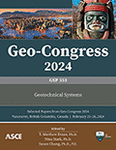Investigations on Fully Softened Strength of Lime-Treated Slopes Built with Expansive Soils under Future Extreme Precipitation
Publication: Geo-Congress 2024
ABSTRACT
Highway slopes built with expansive soils are often prone to surficial slope failures due to volumetric fluctuations from cyclic ingress and egress of moisture arising from repeated wet-dry weathering cycles. This periodic shrink-swell phenomenon may result in the formation of desiccation cracks, which result in the transition of strength from peak to fully softened and subsequently result in surficial slope failures. Calcium-based stabilizers such as lime are often used to negate the effects of high-plastic clay by enhancing strength and subsequently reducing volumetric strains. However, cyclic wetting and drying can often impact the long-term serviceability of such treated slopes. A research study was conducted to understand the efficacy of different lime dosages against surficial slope failures. Laboratory studies were performed on untreated, 5%, and 8% lime-treated soils at two different curing periods to estimate the changes in peak and fully softened shear strengths. Rainfall-induced slope stability analyses were performed on a hypothetical slope considering the effects of future precipitation in Texas and determining the stability of lime-treated surficial slope. Preliminary studies indicate that lime treatment improves the fully softened strength, and a unique relation exists between the treated soil plasticity and the secant friction angle values. Stability analyses indicated that the lime-treated slopes are less prone to degradation from repeated wet-dry cycles due to the formation of a hydrophobic and resilient soil matrix. Overall, the study provides a comprehensive insight into chemically stabilized surficial slope failures and the effects of environmental changes on the serviceability of this transportation infrastructure.
Get full access to this article
View all available purchase options and get full access to this chapter.
REFERENCES
Akcanca, F., and Aytekin, M. (2014). “Impact of Wetting-Drying Cycles on the Hydraulic Conductivity of Liners Made of Lime-Stabilized Sand-Bentonite Mixtures for Sanitary Landfills.” Environ. Earth Sci., 72(1), 59–66.
ASTM. (2019). Annual Book of ASTM Standards. West Conshohocken, PA, USA.
Bhaskar, P., Boluk, B., Banerjee, A., Shafikhani, A., and Puppala, A. J. (2019). “Effect of Lime Stabilization on the Unsaturated Hydraulic Conductivity of Clayey Soil in Texas.” GeoCongress, ASCE, Reston, VA, 773–783.
Biswas, N., Puppala, A. J., Chakraborty, S., and Khan, M. A. (2021). “Utilization of Silica-Based Admixture to Improve the Durability of Lime-Treated Expansive Soil.” IFCEE, Reston, VA, 233–242.
Boluk, B., Puppala, A. J., Chakraborty, S., and Bhaskar, P. (2021). “Forensic Analyses and Rehabilitation of a Failed Highway Embankment Slope in Texas.” Transp. Res. Rec., 2675(8), 121–134.
Daniel, D. E. (1984). “Predicting Hydraulic Conductivity of Clay Liners.” J. Geotech. Eng., 110(2), 285–300.
Downscaled CMIP3 and CMIP5 Climate and Hydrology Projections. (2022). https://gdo-dcp.ucllnl.org/ (Apr. 10, 2023).
Firoozi, A. A., Guney Olgun, C., and Baghini, M. S. (2017). “Fundamentals of Soil Stabilization.” Int. J. of Geo-Eng., 8(1), 1–16.
Makusa, G. P. (2013). Soil Stabilization Methods and Materials in Engineering Practice: State of the Art Review, URN: urn:nbn:se:ltu:diva-24093, Lulea, Sweden.
Nielsen-Gammon, J. W., Zhang, F., Odins, A. M., and Myoung, B. (2005). “Extreme Rainfall in Texas: Patterns and Predictability.” Phys. Geogr., 26(5), 340–364.
Puppala, A. J. (2021). “Performance Evaluation of Infrastructure on Problematic Expansive Soils: Characterization Challenges, Innovative Stabilization Designs, and Monitoring Methods.” J. Geo. and Geoenv. Eng., 147(8), 04021053.
Puppala, A. J., Pedarla, A., and Bheemasetti, T. (2015). “Soil Modification by Admixtures: Concepts and Field Applications.” Chapter 10 in Ground Improvement Case Histories: Chemical, Electrokinetic, Thermal and Bioengineering Methods, B. Indraratna, J. Chu and C. Rujikiatkamjorn, Elsevier, Waltham, MA, 291–309.
Rahardjo, H., Li, X. W., Toll, D. G., and Leong, E. C. (2001). “The Effect of Antecedent Rainfall on Slope Stability.” Unsaturated Soil Concepts and Their Application in Geotechnical Practice, D. G. Toll, eds., Springer, Dordrecht, Netherlands, 371–399.
Rahimi, A., Rahardjo, H., and Leong, E. C. (2011). “Effect of Antecedent Rainfall Patterns on Rainfall-Induced Slope Failure.” J. Geo. and Geoenv. Eng., 137(5), 483–491.
Rao, S. M., Reddy, B. V. V., and Muttharam, M. (2001). “The Impact of Cyclic Wetting and Drying on the Swelling Behaviour of Stabilized Expansive Soils.” Eng Geol, 60(1–4), 223–233.
Shahandashti, M., Hossain, S., Baral, A., Adhikari, I., Pourmand, P., and Abediniangerabi, B. (2022). Slope Repair and Maintenance Management System Final Report Slope Repair and Maintenance Management System, Arlington, TX.
Stark, T. D., Choi, H., and Mccone, S. (2005). “Drained Shear Strength Parameters for Analysis of Landslides.” J. Geo. and Geoenv. Eng., 131(5), 575–588.
Stark, T. D., and Eid, H. T. (1997). “Slope Stability Analyses in Stiff Fissured Clays.” J. Geo. and Geoenv. Eng., 123(4), 335–343.
Zhang, L. L., Zhang, J., Zhang, L. M., and Tang, W. H. (2011). “Stability Analysis of Rainfall Induced Slope Failure: A Review.” Proc. Ins. Civ. Eng.: Geotech, Eng., 164(5), 299–316.
Zhao, S., Shi, Z., Peng, M., and Bao, Y. (2020). “Stability Analysis of Expansive Soil Slope Considering Seepage Softening and Moistening Expansion Deformation.” Water (Switzerland), 12(6), 1678.
Information & Authors
Information
Published In
History
Published online: Feb 22, 2024
ASCE Technical Topics:
Authors
Metrics & Citations
Metrics
Citations
Download citation
If you have the appropriate software installed, you can download article citation data to the citation manager of your choice. Simply select your manager software from the list below and click Download.
